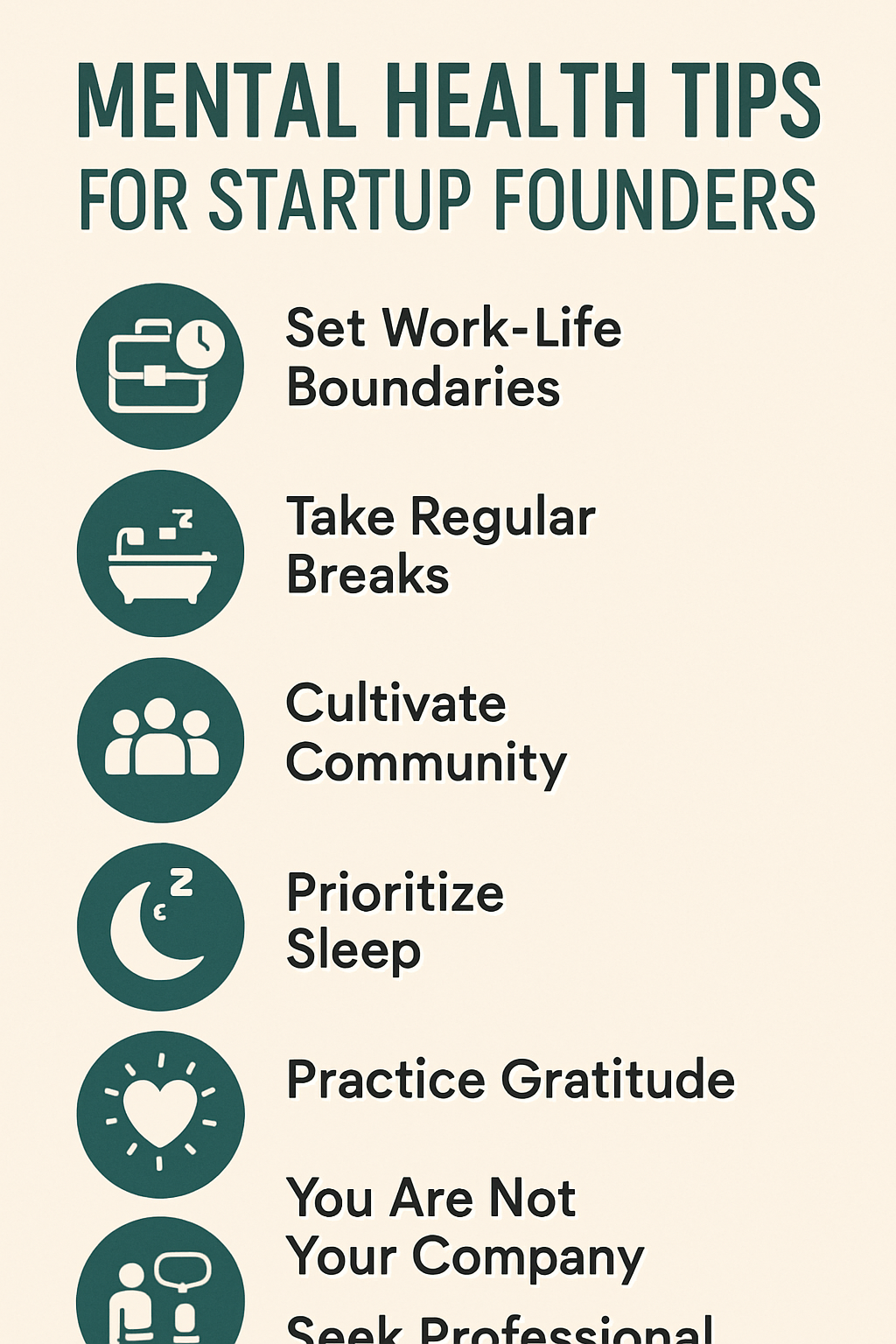
The journey of a startup founder is often romanticized, filled with visions of innovation, rapid growth, and ultimate success.
However, beneath the surface of ambition and relentless drive lies a reality that many founders face:
immense pressure, long hours, and the constant weight of responsibility.
This demanding environment can take a significant toll on mental health, leading to stress, anxiety, and burnout.
It’s a topic often overlooked, yet crucial for sustainable success in the entrepreneurial world.
In this post, we’ll explore why founder mental health is so important and share practical tips to help you navigate the startup storm while safeguarding your well-being.
The Unique Mental Health Challenges of Founders
Being a founder isn’t just a job; it’s a lifestyle that often blurs the lines between personal and professional life.
The stakes are incredibly high, with personal finances, reputations, and the livelihoods of employees often hanging in the balance.
This unique pressure cooker environment makes founders particularly vulnerable to mental health issues.
Studies show that a significant percentage of entrepreneurs struggle with mental health challenges,

Videos are added as random thoughts 💭 💭 💭.
with some reports indicating that 72% of founders experience mental health issues, and 90% admit to struggling with high expectations and fear of failure [1, 2].
Common struggles include anxiety, burnout, sleep issues, and depression.
Founders are also reported to be twice as likely to suffer from depression and six times more likely to suffer from ADHD compared to the general population [3].
The constant need to perform, the fear of failure, and the isolation that can come with leadership all contribute to this challenging landscape.
It’s a culture that often glorifies sacrifice, pushing founders to their limits and sometimes beyond.
Practical Tips for Cultivating Founder Well-being
Navigating the intense world of startups requires not just business acumen, but also a robust strategy for mental well-being.
Here are some actionable tips to help you prioritize your mental health and thrive as a founder:
1. Set Work-Life Boundaries
The line between work and personal life can easily disappear when you’re building a company.
It’s vital to establish clear boundaries.
Learn to delegate tasks, say no to commitments that don’t align with your core priorities, and consciously create space for your personal life.
This isn’t about working less, but working smarter and protecting your personal time [4].
2. Take Regular Breaks and Vacations
Stepping away from your business, even for short periods, is not a luxury; it’s a necessity.
Regular breaks and vacations allow you to recharge, gain fresh perspectives, and prevent burnout.
Disconnecting can significantly enhance your productivity and creativity upon your return [4].
3. Cultivate a Supportive Community
Entrepreneurship can be a lonely journey.
Actively seek out and connect with other founders or mentors who understand your unique challenges.
A strong support network provides encouragement, a safe space to share struggles, and invaluable advice. Sharing experiences can reduce feelings of isolation and foster a sense of belonging [4].
4. Stay Connected with Friends and Family
Beyond your professional network, nurture your relationships with friends and family.
These connections offer emotional support, a listening ear, and a reminder of life outside the startup bubble.
They can provide a crucial anchor during turbulent times and help you celebrate your successes [4].
5. Practice Gratitude and Mindfulness
Shifting your perspective can have a profound impact on your mental state.
Keep a gratitude journal, noting down small wins and things you’re thankful for each day.
Incorporate mindfulness exercises, such as meditation or quiet reflection, to stay present and manage stress.
These practices can help you appreciate the journey, not just the destination [4].
6. Prioritize Sleep
Adequate sleep is fundamental for emotional regulation, stress reduction, and overall cognitive function.
Establish a consistent sleep schedule, aiming for 7-9 hours per night.
Develop a relaxing bedtime routine that limits screen time and prepares your mind and body for rest [4].
7. Create Clear Goals and Priorities
While it might seem counterintuitive, setting clear, realistic goals for both your business and personal life can reduce stress.
Well-defined objectives provide direction and a sense of accomplishment.
Regularly review and refine your goals to ensure they remain aligned with your vision and growth [4].
8. Remember: You Are Not Your Company
Founders often equate their identity with their business, referring to it as their “baby.”
While this dedication can drive success, it can also lead to severe personal repercussions if things don’t go as planned.
It’s crucial to disentangle your self-worth from your company’s performance. View your role as a job you were hired for, rather than your entire being.
This perspective can provide a healthier distance and reduce the emotional toll of setbacks [5].
9. Find the Right Language and Open Up
Talking about mental health is the first step towards addressing it.
Use language that separates the person from the condition (e.g., “I have anxiety” instead of “I am anxious”).
Openly discussing your struggles can normalize the conversation and encourage others to seek help.
Don’t be afraid to acknowledge that mental health challenges can manifest in various ways, not just the commonly perceived ones [5].
10. Avoid the “High Performance” Trap
Startup culture sometimes glorifies working under duress and sacrificing well-being for success.
Be wary of this self-imposed trap.
High performers often push through physical and mental boundaries, but this is unsustainable.
Recognize that true high performance comes from a place of well-being, not constant struggle.
Prioritize self-compassion and understand that maintaining your mental and physical health is crucial for long-term success [5].
11. Build a Portfolio of Mental Health Support
The founder experience is uniquely stressful.
Don’t hesitate to seek professional help. This could include coaching (future-oriented, goal-focused) or therapy (past-oriented, focused on foundational healing).
Many professionals offer complimentary consultations, allowing you to find the right fit.
Additionally, peer support from other founders who are candid about their mental health journeys can be incredibly valuable [5].
References
[1] LinkedIn. (2024, September 18). *11 Scary Truths About Mental Health & Entrepreneurship)
[2] Reddit. (n.d.). *Founders, how do you deal with mental health struggles?()
[3] Startup BOS. (2024, May 8). *Mental Health and Startup Founders: How to Address Burnout and Promote Well-Being
[4] Raleigh Founded. (2023, May 23). 7 Tips for Prioritizing Mental Health for Startup Success*. )
[5] M13. (2024, June 6). *4 Lessons on Mental Wellness for Founders*.
